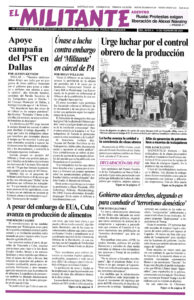President Joe Biden insists he will hold off on any substantial changes to the previous administrations’ moves to bar large-scale immigration across the Mexican border, fearing to trigger a surge from Central America.
This meant Guatemalan soldiers and police saw fit to unleash tear gas and violent assaults against a caravan of 7,500 Hondurans heading toward the U.S. border Jan. 17. Since then at least two-thirds have been sent back to Honduras.
On Feb. 2 administration spokespeople told the press Biden would ask the Department of Homeland Security to “review” Donald Trump’s “Remain in Mexico” policy. This requires those requesting asylum to wait outside the U.S. until they are given a hearing. “Be patient” was the message from Biden aide Roberta Jacobson Jan. 29, as thousands still in Mexico wait for appointments with asylum officials.
The capitalist class in the United States depends on drawing immigrant workers into the workforce to superexploit them, pushing down the wages of all workers and weakening unions. Its goal is not to seal the border, but to manage the flow of immigrant labor depending on the ups and downs of production.
In the midst of many anti-immigrant measures, the Trump administration increased the number of yearly “guest” visas for farmworkers, as previous administrations did, to guarantee a supply of cheap labor for big capitalist farmers. In 2006 the Department of Labor issued less than 50,000 H-2A visas. By the end of the Trump administration that number was 275,000.
Crisis facing Honduran toilers
Despite being an important center for industrial and farm production, Honduras is one of the poorest countries in Latin America.
More than 300 foreign-owned factories in Honduran free-trade zones employ 185,000 workers. Among the major companies with factories there are Ford, Fruit of the Loom, Cargill, Lear Corporation and GM. Chiquita Brands International and Dole Company dominate banana production, the country’s second-largest export crop after coffee.
But the inflow of foreign capital has done nothing to improve the conditions of workers and farmers. The minimum wage in the largest factories is $2 an hour and many farmworkers make less than $177 a month.
On top of these conditions, working people in Honduras were left to fend for themselves following two hurricanes in November. Some 35,000 homes were destroyed in the storms.
Any Ortega, one of those on the caravan heading to the U.S., told the Los Angeles Times that after hurricane floodwaters receded she couldn’t return home. “Houses are still full of mud,” she said. “There has been no help from the government, only from other people.” Her family is still camped out under a bridge.
Many workers are fleeing violence by criminal gangs. And paramilitary groups have killed dozens of peasants who have fought for access to land.
In addition to profits directly extracted from exploiting workers in the factories and fields, the capitalist classes of the U.S. and other imperialist powers also enrich themselves by squeezing interest payments from the Honduran government for their loans. In the last few years the country’s foreign debt has mushroomed to $10.8 billion. Biden’s promise to send $4 billion in aid to Central America will just end up increasing that debt burden.
Until working people find a way to deepen resistance to these conditions, more will try to escape the impact of the capitalist crisis by heading north.
Amnesty for the undocumented
“As long as the U.S. imperialist rulers siphon off the wealth of the semicolonial world,” Róger Calero, Socialist Workers Party candidate for New York City mayor, told the Militant, “workers and farmers in Honduras and elsewhere will face the consequences.”
The SWP calls for amnesty for the 11 million undocumented immigrants, living and working in the United States, Calero said, to strengthen workers’ unity. And the party demands cancellation of the foreign debt of Honduras and other semicolonial countries.
“Workers in Honduras — just like workers in the U.S. — need to rebuild a fighting labor movement and they need their own party, a labor party, that can lead millions to fight to replace capitalist rule with a government of workers and farmers,” Calero said. “A disciplined, fighting, working-class movement in Honduras that stands up to the bosses, their government and to Washington would give inspiration to many more working people to join the struggle to take political power into their own hands.”

